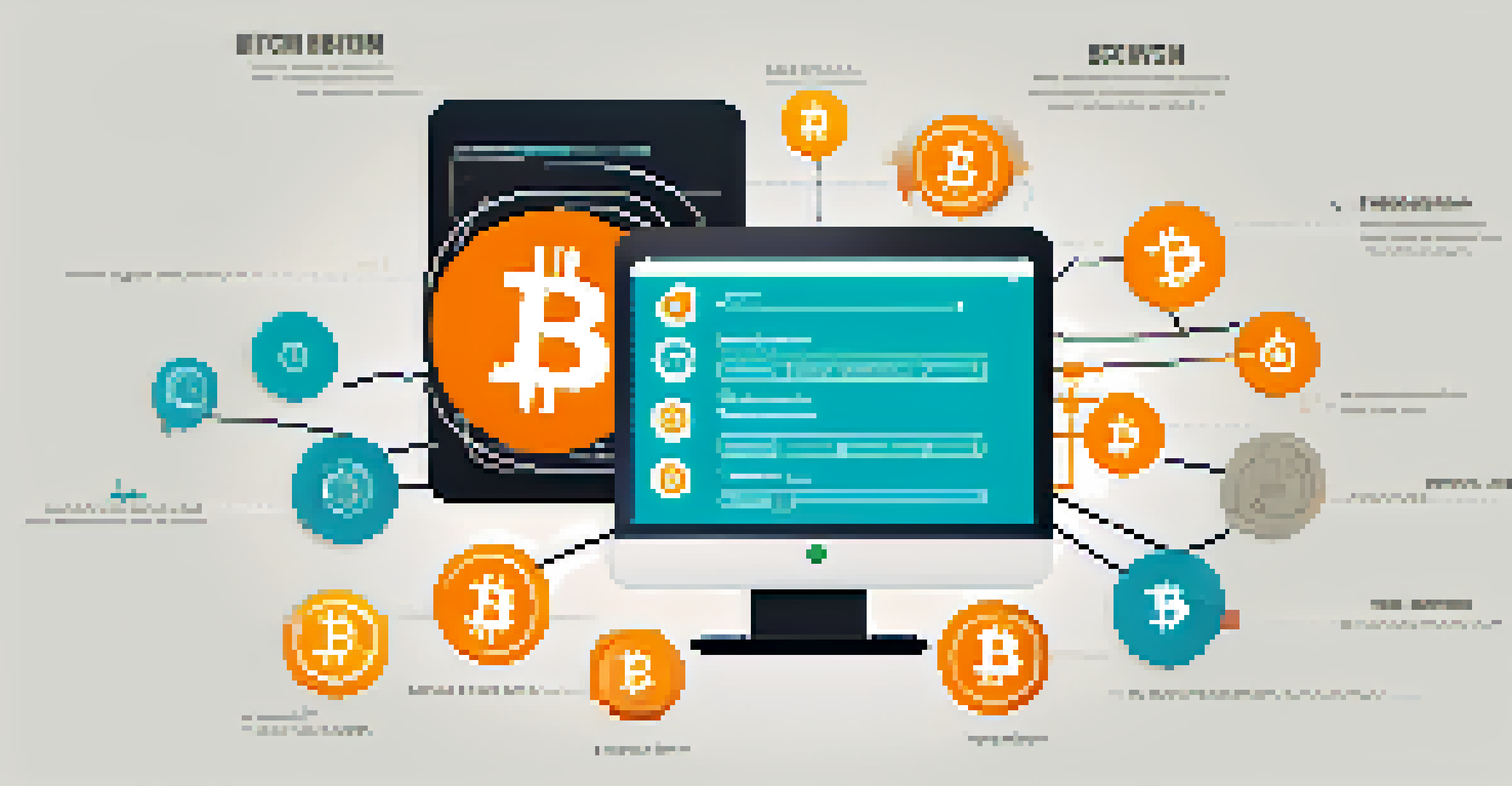How to Securely Transfer Bitcoin Between Wallets Without Risk

Understanding Bitcoin Wallets and Their Types
Bitcoin wallets are essential for storing and managing your cryptocurrency. They come in different forms, including hardware wallets, software wallets, and online wallets. Each type has its own level of security and accessibility, which can greatly affect your transfer process.
In the world of cryptocurrency, security is not just a feature; it's a necessity.
Hardware wallets, for instance, are physical devices that store your Bitcoin offline, making them highly secure against online threats. Software wallets, on the other hand, can be installed on your computer or smartphone, offering convenience but potentially exposing you to malware attacks.
Before transferring Bitcoin, it's crucial to understand the type of wallet you are using and its security features. This knowledge will help you choose the safest method for your transactions.
Setting Up Secure Wallets for Transfers
When preparing to transfer Bitcoin, ensure your wallets are properly set up and secured. This involves using strong, unique passwords and enabling two-factor authentication (2FA) where possible. 2FA adds an extra layer of protection, making it harder for unauthorized users to access your wallet.

Additionally, keep your wallet software up to date to benefit from the latest security patches. Cyber threats are constantly evolving, and outdated software can leave vulnerabilities that hackers might exploit.
Choose the Right Wallet Type
Understanding the different types of Bitcoin wallets—hardware, software, and online—helps ensure you select the best option for security and accessibility.
Finally, consider using a wallet that allows you to generate new addresses for each transaction. This practice enhances your privacy and reduces the risk of your wallet being targeted in the future.
Using Secure Connections for Transfers
Always use a secure internet connection when transferring Bitcoin. Avoid public Wi-Fi networks, as they are often insecure and can expose your sensitive information to cybercriminals. Instead, opt for a private, encrypted connection, such as your home Wi-Fi or a virtual private network (VPN).
The best way to predict the future is to secure it.
A VPN encrypts your internet connection, adding an extra layer of security during your Bitcoin transactions. This way, even if someone is monitoring the network, your data remains protected.
By making sure you’re on a secure connection, you significantly reduce the risk of interception during the transfer process, safeguarding your Bitcoin from potential theft.
Double-Checking Addresses Before Sending
One of the most crucial steps in securely transferring Bitcoin is verifying the recipient's wallet address. Bitcoin transactions are irreversible, meaning once you send your coins, you can't get them back if they're sent to the wrong address.
Before finalizing the transaction, take a moment to double-check the address. You can even copy and paste it to avoid typos, but be sure to confirm it with the recipient as well. A simple mistake can lead to losing your funds forever.
Secure Your Wallet and Connection
Setting strong passwords, enabling two-factor authentication, and using secure connections are crucial steps to protect your Bitcoin during transfers.
Some wallets also offer a feature to save frequently used addresses, which can help reduce the risk of errors in the future. Always remember: measure twice, send once!
Transaction Fees: Balancing Cost and Speed
When transferring Bitcoin, keep in mind that transaction fees can vary based on network congestion. Higher fees can expedite your transaction, while lower fees may result in longer waiting times. It’s essential to balance cost with the urgency of your transfer.
Many wallets allow you to choose your transaction fee, giving you control over how quickly your transaction is processed. During times of high demand, consider using a higher fee to ensure your transfer is completed in a timely manner.
Researching current fee trends can also help you decide when is the best time to make your transfer, potentially saving you money while still ensuring your Bitcoin reaches its destination safely.
Keeping Your Wallet Backup Secure
Backing up your wallet is an essential step in safeguarding your Bitcoin. Most wallets provide a recovery phrase or seed that can restore your wallet in case of loss or theft. However, it's crucial to store this information securely, preferably offline.
Consider writing down your recovery phrase and keeping it in a safe place, such as a safe deposit box or a home safe. Avoid storing it digitally, as this increases the risk of it being compromised by malware or hacking attempts.
Verify Addresses Before Sending
Always double-check the recipient's wallet address before making a transfer to avoid irreversible mistakes that could lead to lost funds.
Having a secure backup ensures that even if something goes wrong during a transfer, you won’t lose access to your Bitcoin entirely.
Monitoring Transactions and Address Activity
After initiating a Bitcoin transfer, it's wise to monitor the transaction status. Most wallets provide a transaction history, allowing you to track whether your transfer has been confirmed on the blockchain. This transparency is vital for ensuring your funds are safely on their way.
You can also use blockchain explorers to check the status of your transaction by entering your wallet address or transaction ID. This tool lets you see confirmations and provides peace of mind throughout the transfer process.

Additionally, keeping an eye on your wallet's activity can help you detect any unauthorized transactions. Regular monitoring reinforces your security and helps you react quickly if something seems off.
Staying Informed About Security Best Practices
The world of cryptocurrency is ever-evolving, which means staying informed about the latest security practices is essential. Follow reputable sources, such as cryptocurrency news websites and forums, to keep up with new threats and security solutions.
Join community groups or forums where experienced users share tips and experiences. Learning from others can provide valuable insights into how to navigate potential risks when transferring Bitcoin.
By continuously educating yourself about security best practices, you can adapt to changes in the digital landscape and ensure your Bitcoin transfers remain secure.